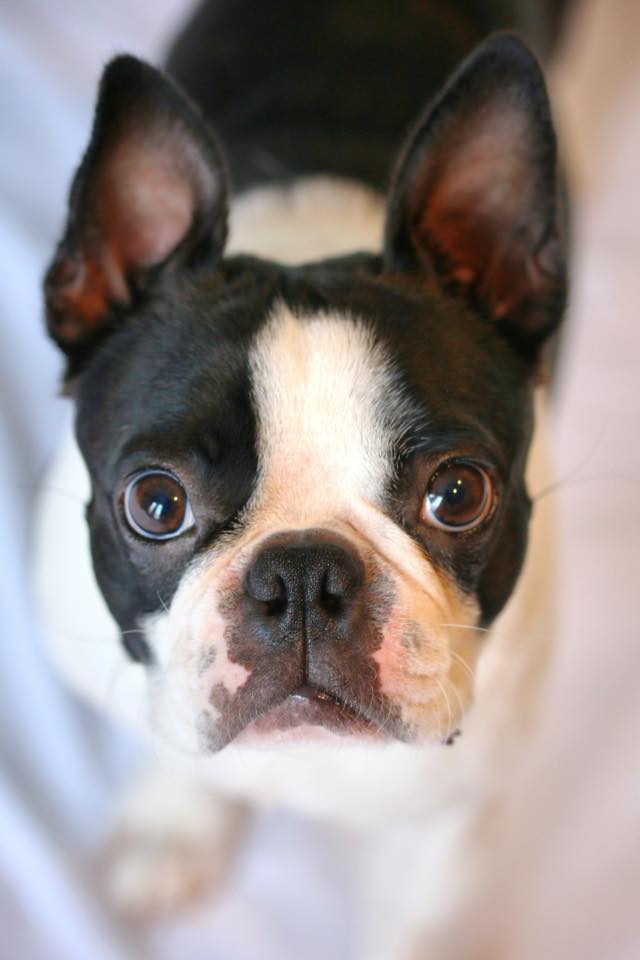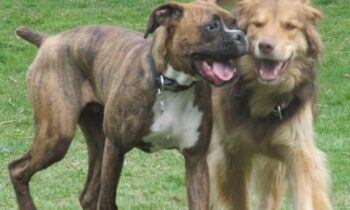
You’ve just brought home your first dog … ever! I asked my friends online—most of them experienced dog guardians, many of them professionals who work with dogs—to comment on the advice they might give to you, a very novice dog guardian.
What information did they think most important to share in a short time?

Photo by Bryn Souza
Here are some of their answers.
Steven Cogswell (Colorado) Give them a safe spot where they can retreat when they need space—and honor it. If they’re in their safe place, let them be. You’ve got plenty of time to show them their new world, so go slow. Let them come to you. The first thing you want them to know is that they’re safe.
Start with a few gentle routines—this is when we eat, this is where we potty—to give their day some shape. Look for your “yes!” moments. Teach the rules of the house by showing them what they can do, not just what they can’t. Give them choices. Let them start to trust their voice matters.
Most of all? Don’t rush it. Unless something urgent is going on, training and classes can wait. Right now, it’s about building the relationship. The rest grows from there.
Kenna Stonefern (New Hampshire) I always tell my puppy people to remember how old their puppy actually is in days. If you get an eight-week-old puppy, you have to remember that your puppy has been alive for 56 total days, and 21 of those days have been where they could not see or hear. If we can think about how old our puppy is in days, it helps us understand and temper our expectations. Think about how much your puppy has experienced and learned in a very, very short amount of time.
Caro Janmaat (The Netherlands) Remember it takes a human about 18 years of training to function in society. Don’t expect your dog to do the same in 18 weeks.
Bob Hadley (Washington) Don’t expect too much too soon. They need to get used to you, the house, the yard … their new world, especially if it’s a rescue, as you really don’t know what has happened before you.
Glenda Lee (Maine) English is not your pup’s language. They don’t know what you want, so give them time and lots of it to learn. Be patient, be consistent, and be loving. Rome wasn’t built in a day and your relationship with your dog takes time and effort. Find a good force-free trainer. And a good vet.
Kate LaSala Ctc Csat (Connecticut) You’re a stranger to your dog. You may be super excited, but let the dog set the pace. Don’t force interactions. Now is the time for trust and relationship building, not obedience training.
Micha Michlewicz (Maryland) The training field is unregulated (except for Germany). Look very carefully at the qualifications of everyone you consider taking advice from.
And get familiar with body language. This will open up a new world of possibilities for both you and your dog. It’s the foundation on which your interactions are built.
Laurel Rabschutz (Connecticut) Know what’s normal. Feel their stomach and glands. Observe how they walk and hold their head. Then when things are off, you’ll know.
Missy Masterson (Arkansas) Other than the initial vet visit, the first order of business will be house training. Think of the puppy as a one-year-old human child who is not potty-trained and has no diaper on. Just as you would never let that baby out of your sight unless it was in a place where it was okay if it peed at will, never let that pup out of your sight. In order to house train him, he must be where you can watch him for his pre-elimination behavior so you can rush him outside to the preselected appropriate elimination spot.
Keep treats handy by the exit door so you can grab a couple on the way out to give him with praise when he potties in your designated area. In the house, I leash a new pup to me so he has to go everywhere with me. I also keep 3 foot tethers in all the rooms I spend most time in and hook him up when I’m busy. If he has an accident, you will see it if he’s near you and can intervene. Pick him up and run him outside to the designated spot.
Canines find the bathroom with their noses. To make this work for us, clean up the accident by removing any solid waste and sop up the liquid waste with an old rag. Take both to your designated outside spot and place/attach to the ground. To clean up the residue on hard surface flooring, mix one part white or cleaning vinegar with one part water and wipe down after removing any solids. If on carpet, after sopping up as much as you can, pour the vinegar-water mixture onto the carpet. Scrub it in with your fingers to get good distribution. Use a generous amount of the vinegar-water mixture and let it soak in about 30 minutes. Then put a thick folded towel over the area and stand on it. Repeat with dry towels until you have removed most of the liquid then open another clean towel up and cover the entire area so it can be walked on without leaving the dirt from your shoes on the damp spot. Once your household is bedded down for the night, remove the towel and set a fan to blow on it overnight to get it dry.
Remember to always praise the puppy while he’s peeing/pooping.
Terry Hill Cunningham (West Virginia) The ages of between 8 and 16 weeks are the most important time in a dog’s life. Early socialization and training are essential. You can’t get this time back.
Frankie Joiris (New Jersey) Remind them that dogs and people have shared lives for hundreds of years. It doesn’t have to be complicated. There is no one right way. If they are happy with how things are, and their dog is thriving, that is enough.



